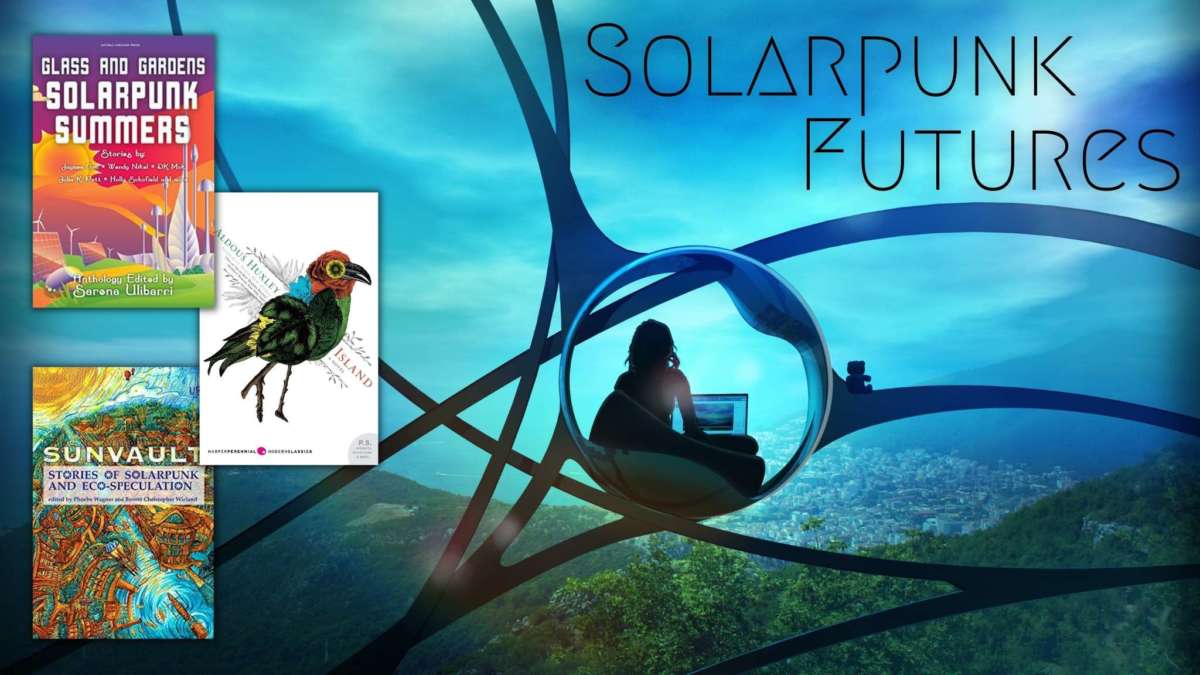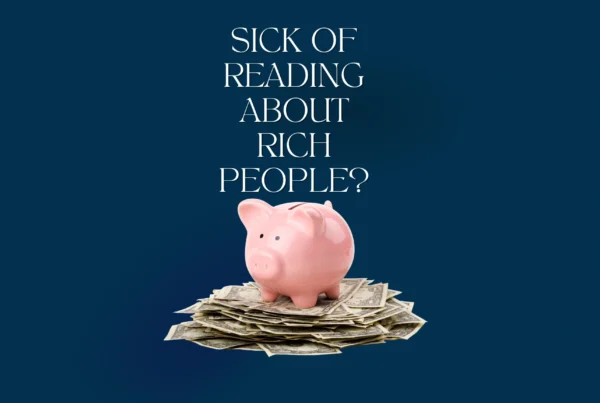When we think of our own speculative or dystopian futures, our thoughts often drift to that of cold and complex technology, unbreathable or toxic air, forms of protective gear to shield us from the sun’s harmful rays, or utilitarian governments hiding major secrets to keep its citizens in the dark. Does this sound familiar?
In any case, the future tends to look shiny and sterilized in a way reminiscent of a band-aid meticulously placed over the various wounds inflicted on planet Earth by our own hands. But there does exist a lush, green alternative to the futures we so often see depicted in the media that could just as easily become a reality — if we truly cared enough to make it happen.
To celebrate Earth Day, we gathered a list of five inspiring books that represent a solarpunk alternative to the near and distant futures.
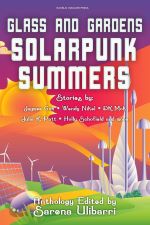 Glass and Gardens: Solarpunk Summers edited by Sarena Ulibarri | World Weaver Press
Glass and Gardens: Solarpunk Summers edited by Sarena Ulibarri | World Weaver Press
This colorful anthology features 17 stories of a future founded on renewable energies meant to lead humanity out of its own destructive path. While the genre of this book rests securely in the sci-fi category with its depictions of fantastical new-world creatures and technologies, Glass and Gardens offers a myriad of creative solutions to issues we are currently faced with such as food shortages, ethics and world conflicts. This world is the picture of adaptation and optimism, both for the future of our world and others we might discover. “Finally a solarpunk anthology where the majority of the stories aren’t climate apocalypse,” exclaims author A.E. Marling. “Visionary science fiction is more important than ever. But we don’t need more dire warnings. We need emergency optimism.”
Amazon | Barnes & Noble | IndieBound | Bookshop
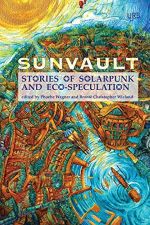 Sunvault: Stories of Solarpunk and Eco-Speculation edited by Phoebe Wagner and Brontë Christopher Weiland | Upper Rubber Boot
Sunvault: Stories of Solarpunk and Eco-Speculation edited by Phoebe Wagner and Brontë Christopher Weiland | Upper Rubber Boot
This collection of speculative fiction, artwork and poetry will hit a little too close to home in our current political and environmental climate. How many times have we seen a start-up invention that seems like it will completely clear the ocean of oil spills, save the bees (and our food sources!), or reduce our carbon footprints outside of having to live off the grid without it completely disappearing, crushed under the foot of big corporations? Sunvault: Stories of Solarpunk and Eco-Speculation focuses on the stories of people who envision a better future and actually take the steps needed to make them happen. They are about embracing change during crucial moments in history so that we don’t get left behind by time. “This collection is a good introduction to some of the dominant themes and ideas in this genre as well as being a good collection of stories,” notes one reviewer. “It is well worth reading.”
Amazon | Barnes & Noble | IndieBound | Bookshop
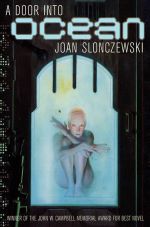 A Door Into Ocean by Joan Slonczewski | Orb Books
A Door Into Ocean by Joan Slonczewski | Orb Books
More of a “What if?” feminist science fiction than speculative history, A Door Into Ocean imagines a distant future that revolves around a nation of pacifist women who inhabit an unknown moon. Sounds like some version of Heaven to those who might think a huge amount of our Earth’s problems center on the present or past decisions of men. In fact, men don’t even exist in this world as the population is highly advanced in biological sciences, reproducing by parthenogenesis. However, as all good things must come to an end, a neighboring civilization that developed their own communities within the depths of the ocean, sends an army out of nowhere. Not all solarpunk novels are simply terraforming and butterflies. “A page-turner, highly readable,” muses one reviewer. “We fall into the trap of expecting a blowout of an ending. The subtle, intelligent essence of the climax could be predicted by careful readers … but it still comes as quite a shock.”
Amazon | Barnes & Noble | IndieBound | Bookshop
 Island by Aldous Huxley | Harper Perennial
Island by Aldous Huxley | Harper Perennial
From the author of Brave New World, Aldous Huxley’s final novel, Island, is his imagination of what an ideal society might become if left to develop on a remote Pacific Island for 120 years. In its many spiritual and societal advances, the island of Pala has accumulated a number of enemies that might try to conspire against it. Huxley himself considered this to be his most important novel as it tells the story of how a cynical outsider can completely transform their way of thinking if given the opportunity to embrace a more positive and hopeful state of mind — and way of life. “Huxley’s final word about the human condition and the possibility of the good society,” writes The New York Times Book Review, “is a welcome and in many ways unique addition to the select company of books — from Plato to now — that have presented, in imaginary terms, a coherent view of what society is not but might be.”
Amazon | Barnes & Noble | IndieBound | Bookshop
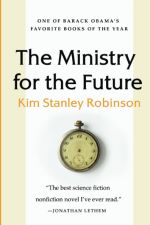 The Ministry for the Future by Kim Stanley Robinson | Orbit
The Ministry for the Future by Kim Stanley Robinson | Orbit
Rather than a novel set in the wastelands of toxic disasters, dilapidated cities and postapocalyptic political failures, The Ministry for the Future stands as more of a warning of what could happen in our current world, if the necessary changes aren’t made to protect ourselves. What this book lacks in a straightforward storyline, it makes up for in the imaginative near-future predictions of fictional eyewitness accounts (human, animal and others) about the daunting and all too real effects of climate change. Scientific discovery, uprooted legislation, terrifying hypotheticals and other musings may seem more grim than optimistic, but they serve as a spark of inspiration to the flame of environmental activism. “If I could get policymakers, and citizens, everywhere to read just one book this year,” declares Ezra Klein of Vox, “it would be Kim Stanley Robinson’s The Ministry for the Future.”
Amazon | Barnes & Noble | IndieBound | Bookshop

Glass and Gardens: Solarpunk Summers by Sarena Ulibarri
This colorful anthology features 17 stories of a future founded on renewable energies meant to lead humanity out of its own destructive path. While the genre of this book rests securely in the sci-fi category with its depictions of fantastical new-world creatures and technologies, Glass and Gardens offers a myriad of creative solutions to issues we are currently faced with such as food shortages, ethics and world conflicts. This world is the picture of adaptation and optimism, both for the future of our world and others we might discover. “Finally a solarpunk anthology where the majority of the stories aren’t climate apocalypse,” exclaims author A.E. Marling. “Visionary science fiction is more important than ever. But we don’t need more dire warnings. We need emergency optimism.”

Sunvault: Stories of Solarpunk and Eco-Speculation by Phoebe Wagner, Brontë Christopher Weiland
This collection of speculative fiction, artwork and poetry will hit a little too close to home in our current political and environmental climate. How many times have we seen a start-up invention that seems like it will completely clear the ocean of oil spills, save the bees (and our food sources!), or reduce our carbon footprints outside of having to live off the grid without it completely disappearing, crushed under the foot of big corporations? Sunvault: Stories of Solarpunk and Eco-Speculation focuses on the stories of people who envision a better future and actually take the steps needed to make them happen. They are about embracing change during crucial moments in history so that we don’t get left behind by time. “This collection is a good introduction to some of the dominant themes and ideas in this genre as well as being a good collection of stories,” notes one reviewer. “It is well worth reading.”

A Door Into Ocean by Joan Slonczewski
More of a “What if?” feminist science fiction than speculative history, A Door Into Ocean imagines a distant future that revolves around a nation of pacifist women who inhabit an unknown moon. Sounds like some version of Heaven to those who might think a huge amount of our Earth’s problems center on the present or past decisions of men. In fact, men don’t even exist in this world as the population is highly advanced in biological sciences, reproducing by parthenogenesis. However, as all good things must come to an end, a neighboring civilization that developed their own communities within the depths of the ocean, sends an army out of nowhere. Not all solarpunk novels are simply terraforming and butterflies. “A page-turner, highly readable,” muses one reviewer. “We fall into the trap of expecting a blowout of an ending. The subtle, intelligent essence of the climax could be predicted by careful readers … but it still comes as quite a shock.”

Island by Aldous Huxley
From the author of Brave New World, Aldous Huxley’s final novel, Island, is his imagination of what an ideal society might become if left to develop on a remote Pacific Island for 120 years. In its many spiritual and societal advances, the island of Pala has accumulated a number of enemies that might try to conspire against it. Huxley himself considered this to be his most important novel as it tells the story of how a cynical outsider can completely transform their way of thinking if given the opportunity to embrace a more positive and hopeful state of mind — and way of life. “Huxley’s final word about the human condition and the possibility of the good society,” writes The New York Times Book Review, “is a welcome and in many ways unique addition to the select company of books — from Plato to now — that have presented, in imaginary terms, a coherent view of what society is not but might be.”

The Ministry for the Future by Kim Stanley Robinson
Rather than a novel set in the wastelands of toxic disasters, dilapidated cities and postapocalyptic political failures, The Ministry for the Future stands as more of a warning of what could happen in our current world, if the necessary changes aren’t made to protect ourselves. What this book lacks in a straightforward storyline, it makes up for in the imaginative near-future predictions of fictional eyewitness accounts (human, animal and others) about the daunting and all too real effects of climate change. Scientific discovery, uprooted legislation, terrifying hypotheticals and other musings may seem more grim than optimistic, but they serve as a spark of inspiration to the flame of environmental activism. “If I could get policymakers, and citizens, everywhere to read just one book this year,” declares Ezra Klein of Vox, “it would be Kim Stanley Robinson’s The Ministry for the Future.”
